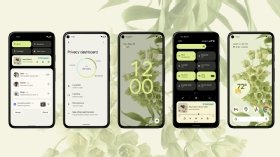
Fotolia
Google overhauls Android appearance, privacy settings
Android 12 will feature larger and rounder widgets, themes based on backgrounds and settings that let users opt out of letting apps access their locations, microphones and cameras.
Google has overhauled Android's design, changing how the mobile operating system looks from the widgets to the lock screen and giving users more flexibility in their privacy settings.
Android 12, which Google launched at its annual conference I/O on Tuesday, incorporates personalization, privacy and interoperability in its redesign, said Sameer Samat, Google's vice president of product management. He said the new OS will feature the "biggest design change to Android in years."
The visuals in Android 12 follow a design system Google called Material You, which adjusts the way things look in the OS according to themes set by the user. Google said the themes are applied to widgets and apps unilaterally and stick with users' account on their browsers and across devices.
One feature will automatically adjust the color scheme to match the dominant and complementary colors of the background image that users set. For example, if a picture has a lot of blue sky, the theme will include a blue shade.
The widgets and app buttons in Android 12 are rounder and bigger than before. Also, the lock screen's clock adjusts in size depending on whether or not there are unread notifications.
Android 12 will have several new privacy features built-in.

The OS will feature a privacy dashboard from which users can see what type of data their apps accessed and when. The dashboard will let users opt out of giving applications access to their location or the device's camera and microphone. They will be able to opt out of either one app at a time or across all apps.
It is not as far as Apple went in letting people opt-out of tracking entirely, but it is further than Android has gone before.
There will also be a sandbox called Private Compute Core that Android 12 will use for AI. The feature ensures speech recognition and intelligent reply in chats don't have access to the network. Instead, they will do their processing on the device.
Google also built into Android 12 software to operate an Android TV, open a car with a digital key and perform other tasks. Google has partnered with BMW for the digital car key initially, with additional partnerships coming.
The news came on a week when Google reached 3 billion Android devices in use around the world. There are about half as many iPhone devices in use.
Android 12 is available now in beta, and the final version will be available in the fall.
Maxim Tamarov is a news writer covering mobile and end-user computing. He previously wrote for The Daily News in Jacksonville, N.C., and the Sun Transcript in Winthrop, Mass. He graduated from Northeastern University with a degree in journalism. He can be found on Twitter at @MaximTamarov.







